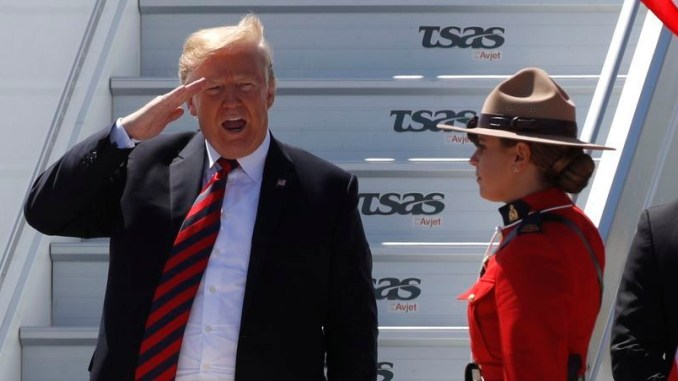Some political operatives believe that President Donald J. Trump‘s tenure in office is creating a window of opportunity for the Nation of Quebec to engage in direct trade talks with the United States, in the context of the USMCA trade treaty, which has not yet been ratified by the parties.
Trump’s ‘pro-patriotism’ and ‘anti-globalist’ worldview is largely congruent with the Bloc Quebecois — which advocates for Quebec’s status as a ‘nation within a federation,’ a governance structure in which Quebec and Canada are seen as equal partners.
Under Justin Trudeau‘s leadership, succession movements have been shaking the Canadian federation — and a second Trudeau term could push Canada into a new constitutional convention, forced to addresses ‘equalization’ policies, which have inflamed regional tensions in recent months.
Equalization is central to Canada’s 1982 constitution and was required to convince Quebec to join the federation, though Quebec has never signed that Constitution. It requires Alberta, with its large oil and gas industry, to transfer billions to poorer provinces.

Quebec has received more than 50% of all equalization payments since the program’s inception in the late 1950s, totaling more than 221 billion. Equalization payments are unconditional – receiving provinces are free to spend the funds according to their own priorities. The program is intended to equalize service delivery between wealthy provinces with high taxing capacity and poorer, less developed provinces with a limited ability to raise revenues.
Regional politics and disparate economic interests exacerbate political tensions on a largely regional basis. A revived Bloc Quebecois has gained 22 seats in yesterday’s Parliamentary election, bringing the successionist party’s seat total to 32 — more than enough to offer Trudeau a governing coalition.
Trudeau’s tenure has ignited a sovereignty movement in the Western interior provinces that has become known as ‘Wexit‘. Polling in recent months shows that nearly half of all Albertans support independence from Canada — largely because of the Trudeau government’s inability to construct the Trans Mountain Pipeline, which would have tripled production capacity in the Alberta oil sands.

That delayed project has left thousands of construction workers in the unemployment line — with the province’s unemployment rate hovering upwards of 7% since the global drop in oil prices in 2014.
Given Alberta’s preference for low-income taxes, the province has been enduring multi-billion dollar deficits under former Premier Rachel Notley, a New Democrat who was ousted from power in a landslide election earlier this year.
Resource wealthy provinces like Alberta, British Columbia, Saskatchewan, and Newfoundland are typically ‘have provinces’ that transfer more than $18 billion a year ($11.7 billion of which went to Quebec), and the Trudeau government is expected to increase those transfers to $22 billion by 2022.
The situation has led to mass resentment. Because Alberta’s GDP is boosted so significantly by its resource industries, a downturn in employment hasn’t benefited the province in the context of the equalization formula. Premier Jason Kenny has been calling for reforms — or perhaps even the elimination of the equalization system altogether.
Exacerbating tensions are environmentalists in Ontario, Quebec, and British Columbia who are staunchly opposed to any new pipelines, especially those that serve the oil sands, where crude processing is far more carbon-intensive than off-shore drilling.
With the Trump administration inclined to support self-governance movements abroad (like Brexit), the USMCA not yet ratified, and an emboldened independence movement in the West — is this the moment that Quebec has been waiting for?
























